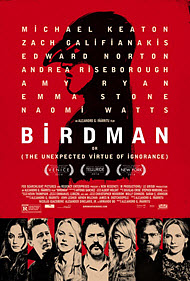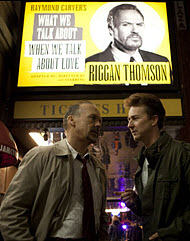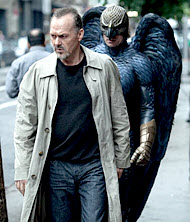Birdman or (The Unexpected Virtue of Ignorance)
 for language throughout, some sexual content and brief violence.
for language throughout, some sexual content and brief violence.
Reviewed by: David Simpson
CONTRIBUTOR
| Moral Rating: | Extremely Offensive |
| Moviemaking Quality: |
|
| Primary Audience: | Adults |
| Genre: | Dark-Comedy Drama |
| Length: | 1 hr. 59 min. |
| Year of Release: | 2014 |
| USA Release: |
August 30, 2014 (festival) October 17, 2014 (limited—4 theaters) November 14, 2014 (wide—857 theaters) January 30, 2015 (976) DVD: February 17, 2015 |







craving the adulation of others and confusing it with love
trying to achieve a feeling of self-worth by doing something noteworthy in one’s profesion—with an attitude of success at ANY cost

The unsaved world is in an endless and ultimately fruitless struggle for love and meaning—apart from God.
understand the importance of God’s truth and light in a culture of sin and mental illness

personal obsession / being obsessed about the wrong things
bitterness / being bitter—and its sad results
being overcome with selfishness and ego
communicating with obscene language and thinking in lewd, impure, lustful ways
nihilism / nihilistic worldview

destruction of husband wife marrige relationship—ending in divorce

destruction of father daughter relationship, due to sin and being an absentee father
daughter abusing drugs and alcohol in a failed attempt to cope

ultimately hearing voices, hallucinations—in battle for sanity
DEPRESSION—Are there biblical examples of depression and how to deal with it? Answer
What should a Christian do if overwhelmed with depression? Answer
| Featuring |
|---|
|
Michael Keaton … Riggan Emma Stone … Sam Kenny Chin … Korean Grocer Jamahl Garrison-Lowe … Daniel (Stagehand) Zach Galifianakis … Jake Naomi Watts … Lesley Edward Norton … Mike Amy Ryan … Sylvia Bill Camp … Crazy Man Jeremy Shamos … Ralph Andrea Riseborough … Laura See all7nbsp;» |
| Director |
|
Alejandro González Iñárritu |
| Producer |
|
New Regency Pictures Worldview Entertainment See all » |
| Distributor |
 Fox Searchlight Pictures, a sister company of 20th Century Fox, a division of The Walt Disney Company |

Riggan Thomson (Michael Keaton) is an actor. Back in the early 90's, he played one of the big superheroes on the big screen, Birdman. Since that success, he has been unable to achieve the same status, and therefore adapts a play by Raymond Carver, “What We Talk About When We Talk About Love.” He is the writer, director, main character and has high expectations for the production as he seeks acclamation for his talent. However, he runs into several problems in the process. He has to replace his male supporting actor, deal with a harsh theater critic, appease his ex-wife, learn how to have a relationship with his daughter who is fresh out of rehab, and also entertain the masses of New York’s Broadway fans.
He hires Mike Shiner (Edward Norton), a big name method actor, who not only directly challenges Riggan’s own performance, but also disrupts preview shows for more truthful performances. Along with all this, Riggan has an alter-ego, his old character Birdman, who frequently entices him to indulge in his own selfish desires, convincing him he deserves it, due to his previous celebrity status and his acting genius. As Riggan descends into conflict with his colleagues, employees, and himself, he has to decide what is truly worth it, and what he really wants from his existence.
Viewers must recognize that the director is Alejandro González Iñárritu. His previous work includes “Biutiful,” “Babel,” “21 Grams,” and “Amores Perros.” He has definite a style of writing and directing. His writing style is always dark. He focuses very heavily on the low points of life, and brings them into the open through his characters. Therefore, they will often deal with violent thoughts, suicide, intense fear, deep passions, or great feelings of despair. He incorporates these into very specific environments, in this case, a theater production. Therefore, you get gritty, true-to-life performances, with strong touches of realistic dialog. Sometimes these make you cringe, sometimes they make you laugh out loud.
His directing style is one of technical ferocity. He stretches the cinematic experience to new heights, and never leaves a scene that is without thought and constructive emotion. He uses heavy symbolism and gives actors challenges that have never faced before. “Birdman” is edited as one continuous shot, therefore you never feel like time has passed between cuts. In fact, it’s so well edited, it’s hard to tell when he cuts between scenes. If you watch this movie from a purely cinematographic experience, you may sit in awe.
Alejandro González Iñárritu is a director who portrays darkness in people and in the world. Therefore, there is much that is difficult to watch. Riggan is driven to succeed. He is desperate to be recognized for his talents. However, he “confuses admiration for love,” as one character succinctly tells him. It’s an unhealthy obsession, and he hears a voice in his head, does intense yoga exercises to keep his mind under control, and loses his cool in many situations despite his best efforts to hide it.
There is a strong theme of being popular and “of the moment.” Characters frequently stress big desires to have “made it,” and need encouragement to be able to continue. This is a mirror image of what it’s like to work in show business. The blurring lines between truth and lies infiltrate every part of your being. It becomes a life challenge to give an impression of security to the majority of the world, while falling apart in front of those that should matter the most. Riggan has lost his wife, and has little to no relationship with his daughter Sam (Emma Stone). But he is obsessed with sorting his own stuff out, before prioritizing them.
As a stronger example of this recurring theme, I will list the character traits, without spoilers. Riggan refinances his house, withdraws from friends, deliberately fires staff who don’t fit his agenda, sleeps with his employees to keep hold of them, and is an a** to everyone in order to achieve success.
Riggan’s two actresses are both insecure, emotionally fragile and dependent on acclamation. They end up making out (with each other) after a particularly bad preview show. Both go to great lengths to convince themselves they’re accepted and valued. Mike Shiner (Norton) is a superb actor, who can be truthful on stage, but behind closed doors, he is unable to maintain relationships . Finally, Riggan’s daughter Sam, has just come out of rehab, hates her dad for never being around as she grew up, and generally gives an aura of not caring about anything. This hides her great desire to have a father again. Everyone is living a lie, in reality, but desiring great levels of truth and love in their false world of the theater due to their own disappointments and failures in life. Ultimately, they are all seeking love.
The themes of popularity are not encouraged. They are so prevalent due to the nature of the characters themselves, and “Birdman” clearly shows the downfall of those that obsess over it. Family is highly valued in a strained backward way. Riggan does a turn around with his ex-wife and daughter, realizing that he had never prioritized them. This revelation changes his whole perspective of life.
There is, however, much to be offended by in “Birdman.” Frequent language, discussions of relationships and illicit sex within them, references to adultery, a threat of on-stage rape (in the name of method acting), a number of fist fights, a make-out scene between two women, and several recurrences of a man shooting himself in the head.
This is a realistic dose of people struggling with insecurity, and desperation to be loved. I don’t believe Iñárritu put any of this in “Birdman” for the appeal. It all serves a purpose to tell how desperation and despair affect us. It’s dark. It’s funny in parts, desperate in others.
But we are loved by God. Loved to a level that we will never comprehend. But this is only something that those of us who have accepted Him have any comprehension of at all. For those struggling every day to “make it” within their sphere, all they have is themselves. They have to make it work, even sacrificing parts of themselves in the process.
 Discover God’s promise for all people—told beautifully and clearly from the beginning. Discover The HOPE! Watch it online—free.
Discover God’s promise for all people—told beautifully and clearly from the beginning. Discover The HOPE! Watch it online—free.As believers, we can find our security in God. We can live in the knowledge that we are made in His image, created for good works, that He planned ahead for us (Ephesians 2:10). That is a huge part of the Gospel, and what we can share with others. “Birdman” portrays a world of people that desperately need this message. People in the film and entertainment industry are not fulfilled by their “success,” celebrity status, or money (and need our prayer). Ultimately, we are all empty without our Savior. How important our testimonies are, and how important Jesus is.
 Stumped about how to share your faith in Christ with others? Our EffectiveEvangelism.com site assists Christians in effectively reaching out to others with love and truth. Learn about the worldview of the people you meet, ways to share the gospel, read stories submitted by site users, and more.
Stumped about how to share your faith in Christ with others? Our EffectiveEvangelism.com site assists Christians in effectively reaching out to others with love and truth. Learn about the worldview of the people you meet, ways to share the gospel, read stories submitted by site users, and more. Violence: Moderate to Heavy / Profanity and lewd vulgarity: Extreme—“Jesus Christ,” “Ah J*sus,” “Christ” (2), “G*d-d*mn” (10), “Oh my G*d” (3), “Oh G*d” (3), “God” (2), “For the love of G*d,” “Oh for G*d's sakes,” “Swear to G*d,” “Honest to God,” “My God,” “hell” (7), f-words (110+), various slang words for genitals, “a**-h*le” (5), “a**” (9), s-words (45+), and various other vulgarities and lewd comments / Sex/Nudity: Extreme
See list of Relevant Issues—questions-and-answers.


Moral rating: Very Offensive / Moviemaking quality: 4
I caution anyone with any degree of suicidal ideation to avoid this movie. Do not recommend this movie to anyone who is suffering from depression.
“M.A.S.H.” is a black comedy. “Catch-22” is a black comedy. “Birdman” is not a black comedy. It is not comedic, the frantic Michael Keaton scene running through Times Square notwithstanding. The movie is black. Black as the darkest crevices of Hell itself.
The one scene with the street preacher shouting out the words of Nietzsche epitomizes the thrust, gist and ethos of the movie. There is rampant drum-beating (literally and figuratively) of perspectives antithetical to Christ. Topics such as suicide, selfishness, adultery, lesbianism, infidelity, crass vulgarity, selfishness, mendacity, drug use, et. al, are either lauded, or, at best, treated with indifference. I will not dwell on the particulars.
Suffice it to say the pernicious inculcations found in this movie are overwhelming. Isaiah 5:20 warns: “Woe to those who call evil good and good evil, who put darkness for light and light for darkness, who put bitter for sweet and sweet for bitter.”
Moral rating: Extremely Offensive / Moviemaking quality: 4½
One of the writers is an Argentinean whose partner is a transvestite. Now, someone in a dark relationship is not going to be writing a movie inspired by the Holy Spirit! Nicolás Giacobone, the writer I am referring to, said: “Birdman began as an absurd Project. Alejandro (Iñárritu) wanted to make a comedy, and he only had an image of a man levitating in boxers shorts, and, we had to find a story behind that image”. To me those words speak for themselves…
Moral rating: Extremely Offensive / Moviemaking quality:
PLEASE share your observations and insights to be posted here.
My Ratings: Moral rating: Better than Average / Moviemaking quality: 4½